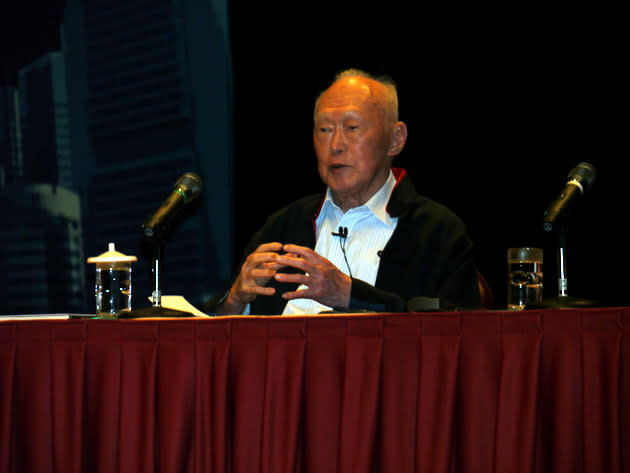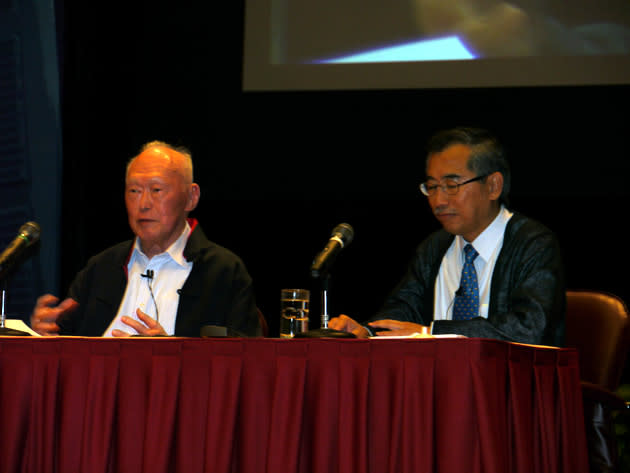‘Political divide must not become national divide’

Singapore should prevent its political divide from turning into a national divide, as the latter situation will mar the country's performance and growth, says former minister mentor Lee Kuan Yew.
Addressing some 1,800 undergraduates at the Nanyang Technological University ministerial forum on Monday evening, Lee said that since Singapore's independence in 1965, it was the country's solid backing of a meritocratic system that had pushed its standards of education and growth to unprecedented heights.
"A political divide... has already happened," he said. "But if a political divide remains one and not a national divide where national issues are concerned, then the impact on our growth will not be very much."
Lee went on to cite the "constant bickering" that he observed in countries with two-party systems such as the US, UK, France and Germany, saying that should Singapore experience a national divide, it will become "just another ordinary country, with the same problems".
"So my worry about the future is whether we'll have the same national solidarity, the same desire to increase education and increase performance, and having the best people in the best jobs... once we veer away from hat meritocratic system, our performance will drop," he said.
When asked about the applicability of his strict, authoritarian-style leadership to younger Singaporeans of today, the soon to be 88-year-old veteran leader acknowledged a changed attitude and receptiveness of citizens to policies.
"As Singapore grows more segmented, with more diverse educational levels, you will not have the same homogenous mass of people to rally behind a single policy," he said, comparing this to the period he spent as Singapore's first prime minister, when education levels were much lower.
"So it's a different society that we face, and therefore the political leaders (of today) will have a much more complicated job of getting society as a whole to accept programmes which are segmented to meet the needs of various strata of society," he added.
Lee went on to explain why he saw there could no longer be a one-size-fits-all way of doing things in Singapore, saying, "You have a highly competitive economy, with competitive different groups of people, so it becomes very difficult to forge policies which are homogenous and appeal to all... They have to be segmented to fit each social group."
Sharing his thoughts on the greatest challenges that Singaporeans will face in the coming decade, Lee addressed the students candidly, reminding them not to adopt an attitude of expectation when they graduate with their respective degrees.
He said that as compared to the 1960s and 70s, where university graduates constituted just five to seven per cent of every cohort of students, today, some 50 per cent of each batch of Singaporean students will have graduated from a university, either locally or abroad.
"I think our biggest challenge is... not to say, well, I'm a graduate, and so I deserve more. This is one of the problems we now have... because of the expansion of our universities, and then you have the (students from) polytechnics becoming graduates of universities in Britain, you have a situation where 50 per cent of the population says, I am a graduate and I expect these rewards."
"We haven't become brighter as a population -- we've become more educated, that's all," said a very candid Lee. "That's the problem the government faces, and that's the problem the public faces (the attitude of expectation), because they've got to understand that no policy can satisfy all segments."
Over the no-holds-barred 45-minute question-and-answer session, Lee fielded questions raised on a wide variety of topics, from nuclear power to food security, and on hot-button issues like foreign talent and the changing political landscape of Singapore.
When asked about the increasing political awareness of young people in Singapore, Lee shot back, saying that political awareness involved knowledge of the "political divides between classes, the way the economy is going, and what opportunities there are for different groups of people."
"Being politically aware after the (general) election means you just got excited over the election, and voted for one party or the other," he said. "That does not mean you are politically aware. If you were politically aware, your votes would have been much wiser," he added, to laughter from the audience.
He was also asked about the comment made by Major-General Chan Chun Sing, Acting Minister for Community Development, Youth and Sports, about religious harmony in Singapore.
To that, Lee responded that he disagreed with MG Chan's views that there is a divide between religious and non-religious people in Singapore, asserting instead that it lay between competing religions.
Being an agnostic himself, however, Lee concluded, "If you try to convert me, I'll say thank you very much. I've thought about heaven and hell, and I'm prepared to face either, if either of them exist."



